Photo

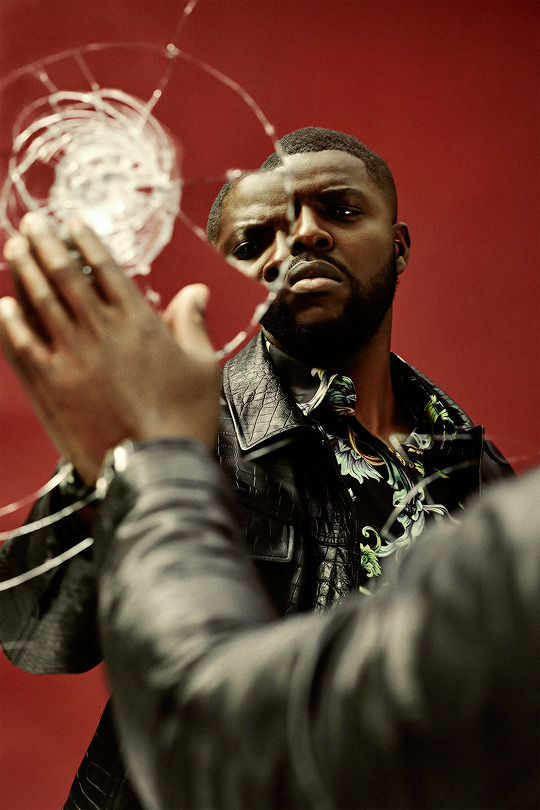

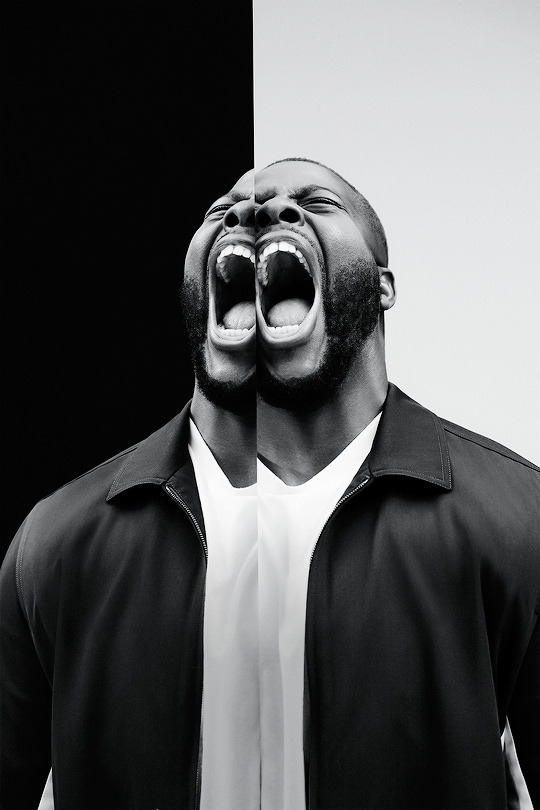
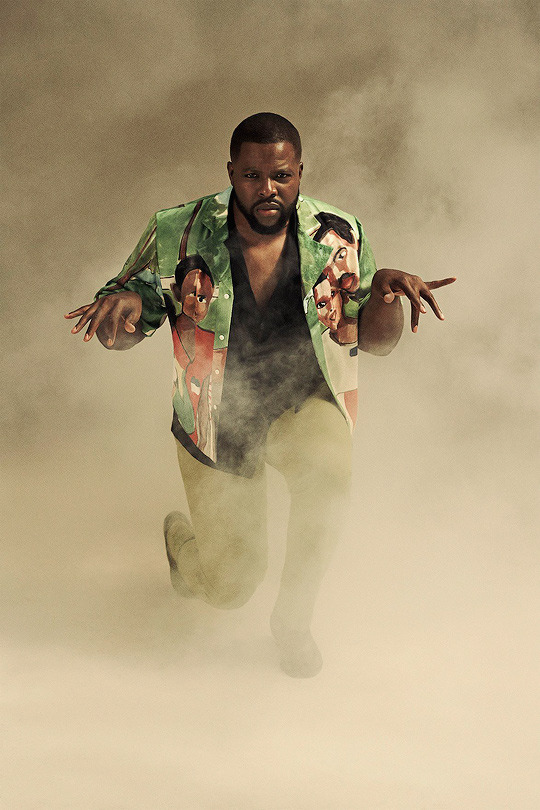

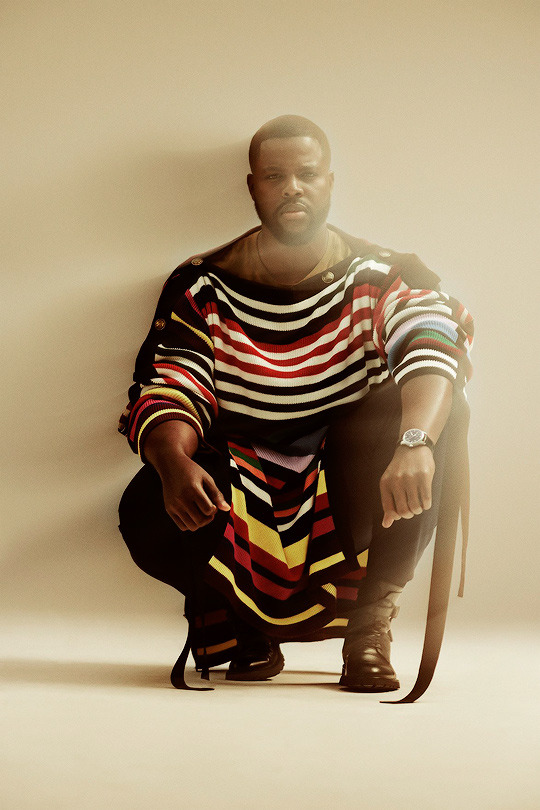
“I’m six-foot-five and over two-hundred- some-odd pounds. You don’t get to see a lot of my body type in fashion. I really loved that in this shoot we got to push the envelope of what types of bodies fit in the world of high fashion and representation.”
Winston Duke ph. by Carlos Serrao for Esquire Magazine (2019)
86K notes
·
View notes
Text
Canon: This is how the story goes
Fanfiction writers:

45K notes
·
View notes
Text
WAYS TO SUPPORT/BE AN ALLY
Here is a compilation of places to donate (IF you can, simply reblogging and sharing this can help) and petition to sign. I found these websites and organizations on twitter.
DONATIONS
THE MINNESOTA FREEDOM FUND: Donate to this to collect funds to pay jail bonds for the protesters who get arrested.
BLACK LIVES MATTER: An organization fighting for the BLM movement. Donate if you can.
BLACK VISIONS MN: an organization that is led by Black, Queer and Trans people. Donate if you can.
NAACP Legal Defense Fund: Fights for the overall equality fight. Donate if you can.
PETITIONS
Willie Simmons has spent 38 years in prison for a $9 robbery. He had two prior convictions similar to robbery that he served time for. He was prosecuted under the Alabama Habitual Offender law and was given a life sentence for his third strike - stealing 9 (NINE) dollars. Sign his petition.
Breonna Taylor was killed by police who were conducting an UNANNOUNCED drug raid, where they gave no request to enter. They bashed her door and entered, shooting her EIGHT times. They were in the WRONG HOUSE.
George Floyd was killed by a police officer who knelt on his neck and suffocated him to death, after George pleaded with the officer and told him he couldn’t breathe. The officer had pulled him from where he sat in his car on an alleged FORGERY. You can also text “FLOYD” to 55156
ARREST THE OFFICERS WHO KILLED GEORGE FLOYD: The main police officer who murdered George is being kept in PROTECTIVE CUSTODY. You probably have heard he was arrested, but this is NOT TRUE. He was placed under PROTECTIVE custody because of the riots and “threats” on his life.
If you know of ANY other organizations or petitions, PLEASE ADD TO THIS LIST. The fight for justice doesn’t end here, it will never end. Especially when the president of the United States calls white supremacists good people and protesters of a mans death THUGS. USE YOUR VOICE. NO JUSTICE, NO PEACE. FUCK COPS. FUCK “BLUE LIVES”. ALL BLACK LIVES MATTER!
92K notes
·
View notes
Text
Want me to gush about my OCs?
Send me a “🖊+an OC“ and I will talk about that OC! It can be a headcanon, a fun fact, a small paragraph of backstory- anything!
Alternatively, send in just a “🖊“ and I will talk about any one of my OCs at random!
41K notes
·
View notes
Text
I’m so glad you see seven as the correct color lol
That sounds like a great idea! I think you can really easily incorporate synesthesia with that concept without it being overdone. I also associate personalities with colors and I think that could be a fun narrative device (ex. all of my friends are warm color toned, but I find they become more beautiful the closer they are to me)
If you ever want to bounce ideas my DMs are always open!
okay, as promised, here’s a primer for writing characters with synesthesia!
first off, what is synesthesia?
in basic terms, it’s a condition where stimulation of one sense provokes stimulation of another sense, involuntarily. these can be combined in a TON of ways, but there are a few common ones! you can’t learn synesthesia, or make yourself have associations. they must happen naturally.
all of these can be either associative or projective. associative means that you know the association is there, but you don’t experience it. projective means that you literally experience the assocation physically.
color grapheme (which I have) - letters and/or numbers have strong color associations, or are seen as colorful on the page. ordinal-linguistic personification (which I have) - letters/numbers have genders and personalities. yes, I know that sounds weird. chromesthesia - sounds have color associations. spacial-sequence - number sequences have physical locations in space. auditory-tactile - sounds create physical touch sensations. mirror-touch - rare, but the synesthete experiences sensations that they see happening to another person. they see someone get tapped on the shoulder, they feel a tap on their shoulder. lexical-gustatory - tastes are associated with words
there are absolutely more, and we haven’t catalogued all the types. chances are, if you want to combine two senses, you can file it away under synesthesia!
now, this condition is pretty rare, but also incredibly under-represented in media. I can think of a few good examples of it (A Mango Shaped Space, The Name of This Book is Secret, The Bright Sessions), but it’s really fun and could be used for a unique character trait!
how to write it (well)?
this is by no means a complete guide, but here are some tips if you want to incorporate it!
1. write down your character’s associations
I CANNOT stress this enough. If you plan to mention the associations at all, keep track of them! part of the diagnostic criteria is that the associations must be long-lasting and static. they do NOT change.
2. we don’t know we’re different at first
until you ask other people about associations, or read up on synesthesia, you have no idea that you’re different. I thought everyone saw the number 2 as blue until like fifth grade.
3. we argue (A LOT)
in fact, it’s a bond in the community. we playfully call each other stupid and wrong all the time when we compare associations. my friend sees 7 as orange, I see it as green. we’re both convinced we’re right. @synnie-battles is an entire blog about this.
4. don’t overdo it
it’s super cool to mention it, and have it as a character trait, but unless we’re actively explaining it to someone, we don’t think about our associations. It’s a subconscious and natural part of life. so, if you want to incorporate it, consider having two characters argue ( see above ), or have characters ask about associations! that happens all the time when people find out about syn.
example (bad): Brett skimmed the page, eyes taking in all the many colors of the words. From the kitchen, his mother slammed a cupboard. His vision flashed blue, and he flinched.
example (better): “What color is my name?” asked Anita, eyes bright with curiosity. He hadn’t really considered it up until now, but the beautiful reddish-brown was a match for her gentle personality.
5. it’s a beautiful mix of fun and obnoxious
fun! we have an extra sense that most people don’t have. there’s a lot of magic in that, and we wouldn’t trade it for anything. once we’re aware of that we have it, it becomes a fun fact we share with people. it’s my go-to “Tell us one thing about yourself” answer
obnoxious! I can’t do mental math. I am incapable. the colors won’t let me. languages are difficult. the colors of ‘cat’ and ‘gato’ are completely different, so my brain reads Spanish as wrong.
6. an easy way to incorporate it is with art
many synesthetes use their associations to make art! people paint songs, they cook sensations, they write poetry. one of my characters in my WIP Sepia has color-grapheme, and the only time it’s really brought up is in the context of how he’s written color-coded poetry. it’s small details that can bring it to life!
so, in conclusion, have fun with it! make your characters synesthetes! and always feel free to send me any questions you might have about anything. I’m always willing to chat about it!
#Lucas.txt#the entity down the street#hope you don't mind me replying :) i like to engage w people on this post
1K notes
·
View notes
Note
hi! i just saw your wip page for "sepia" and i wanted to say i think the idea is really gorgeous. two questions! 1) if you have a tag list, may i please by added? and 2) what has been the most intriguing part of writing it so far?
Oh, wow, thank you! This was really sweet to wake up to.
I haven’t been active on here in a veryyy long time so I’m planning a little revamp and then you can absolutely be the first person on the Sepia tag list! (I think I lost the last one when I switched laptops whoops)
As for the most intriguing part of writing it, I think that’s probably a tie between the research itself and writing the epistolary format of a lot of it.
I have a lot of generalized knowledge about the social dynamics in WWI/WWII/The Interwar Period, however, it’s a lot more challenging to find good sources on queer relationships at the time. I love to dive into research tasks, though, so most of that has consisted of digging up primary sources.
I don’t really write epistolary forms often, but letters are both a really essential part of the story and a really good way to get to know your characters! Getting them the way I want them has been trial and error and I’m very much enjoying the process.
#sunnydwrites#answered#this got SO long winded but we're all writers here lmaoo#anyways thank you again!#I just saw you followed me so I'll be checking out your pages here soon
5 notes
·
View notes
Photo
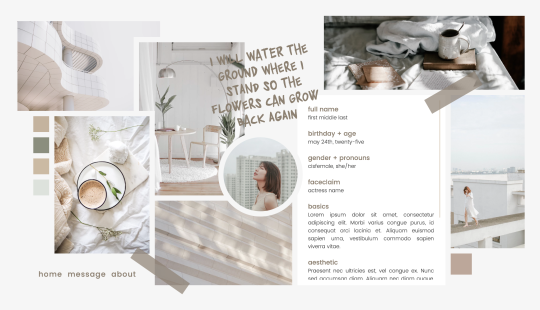
page theme three: soft universe by pirateskinned ↳ static preview — pastebin
about / moodboard page theme
seven images, sizes can be found in the code though everything automatically resizes
three custom links, five accent colours and room for a quote
text area which can be filled with statistics or a block of text - overflows automatically
basic html and css knowledge is required to use this page
don’t use as base code, remove credit, take parts of the code or repost / claim as your own. do edit and make it your own. if you like my themes, please consider supporting me. please like / reblog if you plan on using.
3K notes
·
View notes
Note
🔥 hit me :)
writing about something doesn't necessarily mean you agree with it?? if you write about an abusive relationship, it doesn't mean you condone it irl. what really matters is the portrayal, and the avoidance of falling into bad tropes surrounding the topic. there is a difference between portraying and glorifying something and i NEED some people to understand this
38 notes
·
View notes
Text
oh my GOD i found the backup file
something…. happened. and i lost 30k of a draft. so i’m in an absolutely spectacular mood
5 notes
·
View notes
Text
10 Mistakes to Avoid in Horror
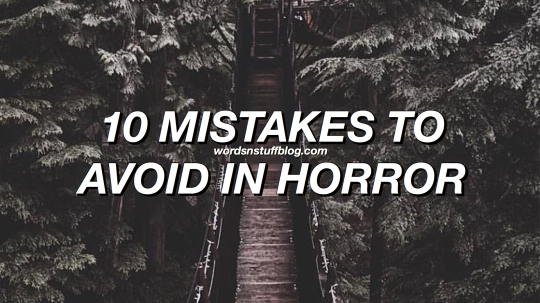
Patreon for early access & exclusives || Ko-Fi
Masterlist || Work In Progress || Studyblr || Studygram
–
Valuing Shock Over Imagination
I’m only going to say this once: readers will always choose an imaginative story over a shocking one. Shock horror, gore, cliché, and easy solutions that the characters overlook for the sake of plot progression is shitty writing. Of course, shock, gore, and tropes all have their place in most horror stories but they are not the foundation, they’re the décor.
Keep reading
199 notes
·
View notes
Text
Boring old werewolf instincts:
Sexual jealousy
Constant aggression
Rigid hierarchy
Must win sports
Homophobia And Sexism Is Normal™
Eat people
Cool new werewolf instincts:
There is no five second rule
Corvids are friends
Hang out as a pack
Karaoke
Gotta pee
213K notes
·
View notes
Text
something.... happened. and i lost 30k of a draft. so i’m in an absolutely spectacular mood
5 notes
·
View notes
Text
gaybowserpremonitions replied to your post “okay, as promised, here’s a primer for writing characters with...”
eat my shorts 7 is purple
I really did log in just to argue with you but it’s GREEN you heathen
0 notes
Text
Slipped on Nano the last few days but I also got an official writing position so maybe I’m still the real winner here
6 notes
·
View notes
Text
nano day 6: total word count 11,061
thoughts: leaning as far into the shitty first draft concept as I can. this draft is just going to be exposition and dialogue heavy in the opening, which I can focus on spreading out in draft two. prose is simple but functional and, above all, it’s readable. I think this might be the year where I hit, or surpass 50k, because writing has never gone this smoothly for me before.
happy to be on track!
5 notes
·
View notes
Text
He seemed to do a lot of that, the sighing. He looked, in a word, exhausted.
find the word
I’m just gonna keep pluggin’ away at this, because why not, so:
reblog with the line or short snippet from your WIP that includes the word exhausted/exhausting, and tag a friend should you feel so inclined
86 notes
·
View notes
Text
It’s Not Working: Page One Troubleshooting
As queries become more and more competitive, unprecedented pressure is being put on your first page to grab audiences (or editors, or agents) and pull them in immediately. Even when something is posted online, audiences have a tendency to keep scrolling or give up quickly if the first few paragraphs don’t impress them. If you think your first page needs work, you’ve come to the right place. Let’s do some troubleshooting.
What’s your opening scene?
You can’t have a first page without a first scene. Let’s think about the tone of your book: if you’re writing a comedy, is the first scene funny? If you’re writing horror, is the first scene scary? If you’re writing action/adventure, is your first scene exciting? This is how readers will judge if you can deliver the goods. Make sure your first scene is a reflection of what’s to come.
How do you frame your scene?
Framing refers to the way that you set up your scene for your audience. For instance, if the scene is about stealing the crown jewels, do you frame it from the perspective of the thieves? The security guard? The private eye trying to solve the crime in retrospect? Furthermore, do you start the scene with breakfast that morning, or in the middle of the heist, or afterwards when they find the jewel missing? Framing focuses on where, when, and who.
As a writer, deciding how to frame your scenes to match the tone readers are expecting is a really important tool. In terms of your first page, the most important thing to figure out is how to start it.
What’s your first line?
Once you decide how you want to frame your scene, you can make sure that your first line is the absolute starting point. What kinds of things can you start with? There are infinite possibilities, but a few work better for some genres and tones than others. Here’s a short list:
Setting Description: This places the reader where you want them immediately. It’s great for most genres because the setting you choose and the words you use to describe it will contribute to the tone. But be warned: some readers glance over setting description, so your carefully worded first impression might be skimmed.
Dialogue: This is really hard to do well, but when it works, it’s very effective. This is great for books where you want to jump right into the action. Comedy especially pops to mind, but any genre can utilize this with a lot of work. Remember, the character speaks before we know them. The readers have to have a good reason to care about their story quick, or they might not stick with what they’re saying.
Middle of the action: Running from werewolves. Walking to ask someone to prom. In the midst of a battle. Walking upstairs in the obviously haunted house. You don’t have to be writing an action/adventure to start in the middle of the action, but it works particularly well for that genre. Why wait? Put the reader in the ‘middle’ of the scene. This draws them in faster, but like dialogue, you need to have something right up front that invests the reader in the character.
Character description, third person: Now here’s a way to make readers care about your character before anything else. Like setting description, some people might skim past this, especially if you’re focusing on physical attributes (height, hair color, build) that don’t affect the plot, instead of personality ( @kirstenmcwriter and I did a podcast on this topic that you can find here). If you’re writing a slower paced, character driven story, or using a stylized narrative voice, this beginning can work well.
Character description, first person: The infamous “main character describes what they see in the mirror for some reason” start. This has gotten a lot of flack in recent years, probably because it was so overused. It isn’t inherently wrong. I like to think that any technique could be done well, with enough work and practice, but stopping the story for the narrator to describe themselves, especially in a self-aware way (think: “I should probably say something about myself now. Here’s what I look like” kind of thing) can come off as weak writing. This is really hard to do effectively, and whatever way you have of telling the audience what the narrator looks like, you don’t necessarily need that on your first page. Showing us who they are by what they’re doing or saying works better most of the time.
Waking up in the morning: Another trope that’s gotten torn apart lately. The reason people make fun of this is, again, it’s become overused, but more importantly, it usually buries the action. Starting off with waking up and going through your normal morning routine is not the escapism most readers are here for. Again, anything can be done well. This isn’t a terrible way to start for a comedy, romance, or contemporary YA, as long as it matches your tone, and there is some sort of conflict in the scene.
Dream: This is such a tempting place to start. I know it is, I’ve done it before. But the main issue people have with starting with a dream is that you’ve pulled them into one scene, and then immediately ripped them out. The world that they were sinking into, that you carefully built up, is not what they’re getting now, and some readers might feel cheated. If you are going to start with a dream, make sure what they’re waking up to is as exciting, or funny, or scary, as what they left behind.
Other tips:
A first page does not a book make. Don’t focus so much on your first page or scene that you neglect the rest of your book. Editors, agents, and some readers can tell when a scene has been overworked.
Don’t get caught up trying to make your first line the wittiest thing ever. I have this problem, too. You need to build a whole book, not one line.
Trust the readers to pick up on context. You don’t need to spell out every detail of the world, character, and setting on page one. Put down the necessary details and let the readers have questions- if they’re curious, they’ll keep reading.
Make sure there is some conflict. Every scene needs tension, and for tension you need conflict. I break down exactly what that means and how to get it in It’s Not Working: Scene Troubleshooting, so check that out if you need more support on that.
Proofread, then proofread again. Whether you’re querying or posting online, your first page is your first impression. Typos and grammar mistakes are not going to convince anyone to read more. Text-to-speech sites, beta readers, and reading aloud are all good ways of catching errors. I know this, because every post I make has a least three typos, and they haunt me.
Have fun with it. In theory, you enjoy writing. Don’t get stressed out. Readers can feel joy through a page, and if you enjoyed writing it, it’ll come through.
I hope that helped with some of your first page struggles. For other writing troubleshooting, you can scroll through the tag here. I post new It’s Not Working’s every Wednesday, so send an ask if you have any suggestions for other topics to cover!
122 notes
·
View notes